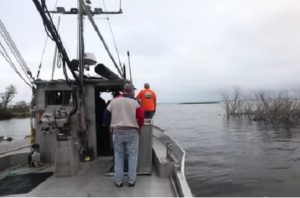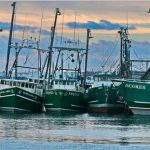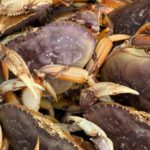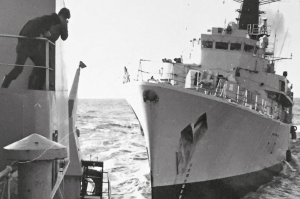Tag Archives: Atlantic States Marine Fisheries Commission
MAFMC and ASMFC Actions on Black Sea Bass, Bluefish, Scup and Summer Flounder
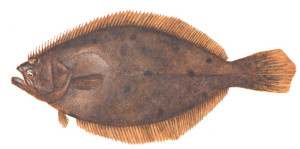 Last week the Mid-Atlantic Fishery Management Council (Council) and the Atlantic States Marine Fisheries Commission (Commission) reviewed previously implemented specifications for scup, black sea bass and bluefish fisheries and modified specifications for summer flounder. The Commission’s actions are final and apply to state waters. The Council will forward its federal waters recommendations regarding summer flounder specifications to NOAA Fisheries Greater Atlantic Regional Fisheries Administrator for final approval. For summer flounder, both groups approved a commercial quota of 5.66 million pounds and a recreational harvest limit of 3.77 million pounds for 2017, an approximate 30% decrease from 2016. This decrease in catch and landings limits responds to the findings of the 2016 stock assessment update, which indicates summer flounder has been experiencing overfishing since 2008. Read the rest here 12:06
Last week the Mid-Atlantic Fishery Management Council (Council) and the Atlantic States Marine Fisheries Commission (Commission) reviewed previously implemented specifications for scup, black sea bass and bluefish fisheries and modified specifications for summer flounder. The Commission’s actions are final and apply to state waters. The Council will forward its federal waters recommendations regarding summer flounder specifications to NOAA Fisheries Greater Atlantic Regional Fisheries Administrator for final approval. For summer flounder, both groups approved a commercial quota of 5.66 million pounds and a recreational harvest limit of 3.77 million pounds for 2017, an approximate 30% decrease from 2016. This decrease in catch and landings limits responds to the findings of the 2016 stock assessment update, which indicates summer flounder has been experiencing overfishing since 2008. Read the rest here 12:06
Draft plan unveiled to curb Southern New England lobster declines
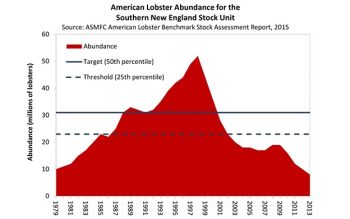 The American Lobster Management Board has released a draft plan responding to declining stocks of lobsters in Southern New England waters that will be considered by the Atlantic States Marine Fisheries Commission at its annual meeting in late October. The proposal presents a suite of management measures to increase egg production and lower harvesting mortality through a combination of management tools that include season closures, trap limits and reductions and changes in escape vent and lobster size regulations. The goal is to increase egg production for lobsters in Southern New England waters from zero to 60%. The draft responds to the 2015 American lobster benchmark stock assessment that found the Southern New England “stock severely depleted and undergoing recruitment failure with poor prospects of recovery,” according to Friday’s statement from ASMFC. Read the rest here 11:13
The American Lobster Management Board has released a draft plan responding to declining stocks of lobsters in Southern New England waters that will be considered by the Atlantic States Marine Fisheries Commission at its annual meeting in late October. The proposal presents a suite of management measures to increase egg production and lower harvesting mortality through a combination of management tools that include season closures, trap limits and reductions and changes in escape vent and lobster size regulations. The goal is to increase egg production for lobsters in Southern New England waters from zero to 60%. The draft responds to the 2015 American lobster benchmark stock assessment that found the Southern New England “stock severely depleted and undergoing recruitment failure with poor prospects of recovery,” according to Friday’s statement from ASMFC. Read the rest here 11:13
Shortage of herring for lobster bait market maxes out Maines Pogey Quota for the first time.
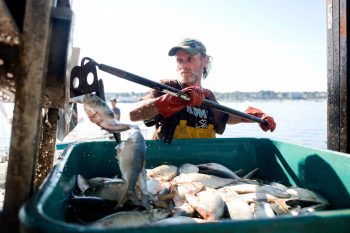 The offshore supply of fresh Atlantic herring, the go-to bait for most Maine lobstermen, has been in short supply, driving prices up as much 30 percent in late July, the Maine Lobstermen’s Association said. The shortage triggered near-shore fishing restrictions to try to stretch out the summer herring catch in hopes of keeping bait bags full as Maine’s lobster season hits its peak. With herring getting scarce and expensive, fishermen have turned to other bait for relief, especially the pogie, the local name for Atlantic menhaden. It’s the No. 2 bait fish among Maine lobstermen, according to a state Department of Marine Resources survey. Maine fishermen have never landed the state’s entire pogie quota, which is set at about 166,000 pounds annually. But this year they had caught all of that and a bit more by July 31, said Megan Ware, head of the menhaden program for the Atlantic States Marine Fisheries Commission, which oversees the pogie catch and other migratory fisheries on the East Coast. Read the story here 09:41
The offshore supply of fresh Atlantic herring, the go-to bait for most Maine lobstermen, has been in short supply, driving prices up as much 30 percent in late July, the Maine Lobstermen’s Association said. The shortage triggered near-shore fishing restrictions to try to stretch out the summer herring catch in hopes of keeping bait bags full as Maine’s lobster season hits its peak. With herring getting scarce and expensive, fishermen have turned to other bait for relief, especially the pogie, the local name for Atlantic menhaden. It’s the No. 2 bait fish among Maine lobstermen, according to a state Department of Marine Resources survey. Maine fishermen have never landed the state’s entire pogie quota, which is set at about 166,000 pounds annually. But this year they had caught all of that and a bit more by July 31, said Megan Ware, head of the menhaden program for the Atlantic States Marine Fisheries Commission, which oversees the pogie catch and other migratory fisheries on the East Coast. Read the story here 09:41
Rules tightened on shark fin removal at sea
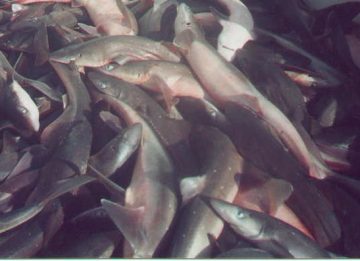 Interstate regulators are tightening the restrictions on the last species of shark that can have its fins removed at sea in the U.S. Smooth dogfish are the only sharks from which American fishermen can remove fins at sea. Many other sharks can be hunted, but fins can’t be removed until processing on land. The Atlantic States Marine Fisheries Commission voted Tuesday to approve a new rule that allows fishermen to bring smooth dogfish to land with fins removed, as long as their total retained catch is at least 25 percent smooth dogfish. Right now, they can bring ashore as many as they choose. The rule change would better incorporate the Shark Conservation Act of 2010 into management of the dogfish, staff with the fisheries commission said. The dogfish are harvested from Rhode Island to North Carolina, and are among the many shark species that fishermen bring to land in states from Maine to Texas. Sharks are also hunted for their meat, but their greatest value is in their fins, which are used to make shark fin soup. Read the rest here 17:33
Interstate regulators are tightening the restrictions on the last species of shark that can have its fins removed at sea in the U.S. Smooth dogfish are the only sharks from which American fishermen can remove fins at sea. Many other sharks can be hunted, but fins can’t be removed until processing on land. The Atlantic States Marine Fisheries Commission voted Tuesday to approve a new rule that allows fishermen to bring smooth dogfish to land with fins removed, as long as their total retained catch is at least 25 percent smooth dogfish. Right now, they can bring ashore as many as they choose. The rule change would better incorporate the Shark Conservation Act of 2010 into management of the dogfish, staff with the fisheries commission said. The dogfish are harvested from Rhode Island to North Carolina, and are among the many shark species that fishermen bring to land in states from Maine to Texas. Sharks are also hunted for their meat, but their greatest value is in their fins, which are used to make shark fin soup. Read the rest here 17:33
The Atlantic States Marine Fisheries Commission could increase menhaden catch
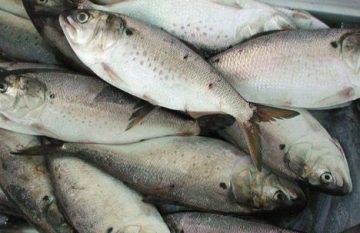 New Jersey commercial bait fishermen want to see the coastwide catch of menhaden increased nearly 80,000 metric tons. “We’re focused on the science. If the science supports an increase, we want to take it,” said Jeff Kaelin from Lunds Fisheries, a commercial fishing operation in Cape May. The amount of menhaden fishermen will be able to take from the water next year will be decided Wednesday in Alexandria, Virginia, when the Atlantic States Marine Fisheries Commission meets. The Atlantic Menhaden Technical Committee has given the ASMFC options that would allow the catch to increase by as much as 10,000 to 80,000 metric tons. Kaelin said Jersey gill netters have been shut out of the fishery since July 4, after fishermen reached their allocation for this year. He said if they had more quota, they could be selling bait to New England lobstermen who are clamoring for bait. Read the rest here 19:22
New Jersey commercial bait fishermen want to see the coastwide catch of menhaden increased nearly 80,000 metric tons. “We’re focused on the science. If the science supports an increase, we want to take it,” said Jeff Kaelin from Lunds Fisheries, a commercial fishing operation in Cape May. The amount of menhaden fishermen will be able to take from the water next year will be decided Wednesday in Alexandria, Virginia, when the Atlantic States Marine Fisheries Commission meets. The Atlantic Menhaden Technical Committee has given the ASMFC options that would allow the catch to increase by as much as 10,000 to 80,000 metric tons. Kaelin said Jersey gill netters have been shut out of the fishery since July 4, after fishermen reached their allocation for this year. He said if they had more quota, they could be selling bait to New England lobstermen who are clamoring for bait. Read the rest here 19:22
Atlantic States Marine Fisheries Commission Summer Meeting – Alexandria, Virginia August 2-4, 2016
The Atlantic States Marine Fisheries Commission will meet in at the The Westin Alexandria August 2-4, 2016. The agenda is subject to change. The agenda reflects the current estimate of time required for scheduled Board meetings. The Commission may adjust this agenda in accordance with the actual duration of Board meetings. Interested parties should anticipate Boards starting earlier or later than indicated herein. Board/Section meeting proceedings will be broadcast daily via webinar beginning at 10:15 a.m. on August 2nd and continuing daily until the conclusion of the meeting (expected to be 4:00 p.m.) on Thursday August 4th. Click here for details, Click here for webinar 10:45
Restrictions on tap for southern New England lobster fishery
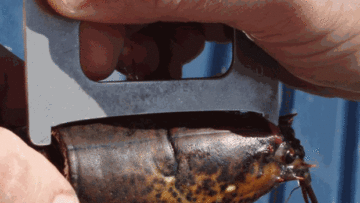 New restrictions are on tap for the region’s historic lobster fishery, which is grappling with an unprecedented decline. Scientists have said lobsters off southern Massachusetts, Rhode Island and Connecticut have declined in the face of the warming ocean. The Atlantic States Marine Fisheries Commission is considering ways to help preserve the species, and a report from the commission says one way to preserve lobsters could be to increase the minimum harvesting size. The commission’s lobster board might take action on the issue Thursday. “The biggest challenge I see is trying to establish an appropriate goal to manage the fishery in the face of what the scientists are telling us is the decline caused by ocean warming,” said Dan McKiernan, a member of the lobster board. Read the rest here 15:43
New restrictions are on tap for the region’s historic lobster fishery, which is grappling with an unprecedented decline. Scientists have said lobsters off southern Massachusetts, Rhode Island and Connecticut have declined in the face of the warming ocean. The Atlantic States Marine Fisheries Commission is considering ways to help preserve the species, and a report from the commission says one way to preserve lobsters could be to increase the minimum harvesting size. The commission’s lobster board might take action on the issue Thursday. “The biggest challenge I see is trying to establish an appropriate goal to manage the fishery in the face of what the scientists are telling us is the decline caused by ocean warming,” said Dan McKiernan, a member of the lobster board. Read the rest here 15:43
Atlantic States Marine Fisheries Commission extends Herring catch limits to prolong catch of lobster bait
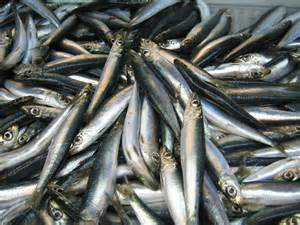 The Atlantic States Marine Fisheries Commission has extended some of Maine’s emergency Atlantic herring restrictions to Massachusetts to try to close a loophole that threatened to derail the summer supply of lobster bait. On Wednesday, the Commission voted 2-1 to cut the number of days that herring boats can land fish each week within its jurisdiction from five to two, with Maine and New Hampshire representatives voting in favor of the landing day reduction and Massachusetts voting against it. Under its emergency rules, Maine had already cut its landing days down to two in an attempt to prolong the availability of fresh herring throughout the lobster season, but boats that fished that area could still land for five days if they sailed to a Massachusetts port such as Gloucester. “Without constraints on the landing (in Massachusetts) we would not make it into August, much less September,” said Terry Stockwell of Maine Department of Marine Resources. Meanwhile, Maine lobstermen are struggling. “The bait freezers are empty,” Stockwell said. And the bait that is available is expensive. Read the story here 09:11
The Atlantic States Marine Fisheries Commission has extended some of Maine’s emergency Atlantic herring restrictions to Massachusetts to try to close a loophole that threatened to derail the summer supply of lobster bait. On Wednesday, the Commission voted 2-1 to cut the number of days that herring boats can land fish each week within its jurisdiction from five to two, with Maine and New Hampshire representatives voting in favor of the landing day reduction and Massachusetts voting against it. Under its emergency rules, Maine had already cut its landing days down to two in an attempt to prolong the availability of fresh herring throughout the lobster season, but boats that fished that area could still land for five days if they sailed to a Massachusetts port such as Gloucester. “Without constraints on the landing (in Massachusetts) we would not make it into August, much less September,” said Terry Stockwell of Maine Department of Marine Resources. Meanwhile, Maine lobstermen are struggling. “The bait freezers are empty,” Stockwell said. And the bait that is available is expensive. Read the story here 09:11
Work on Atlantic Marine Monument not done yet, Eric Reid, North Kingstown, Rhode Island
 In June, House Natural Resources Committee Chairman Rob Bishop, a Republican U.S. Rep. Utah, visited New Bedford and spoke to several members of the industry regarding their concerns about a potential marine monument off the coast of New England. Following the meeting, I remarked to The Standard-Times reporter that a monument could potentially cost the industry up to $500 million in economy activity, in addition to countless jobs. This estimate has been criticized for being far too high. But it is based on two premises — a conservative estimate of the economic impact of fishing in New England, and the lack of clarity surrounding the marine monument discussion. Currently, the commercial fishing industry from Maine to New Jersey brings in an estimated $1.4 billion per year in landings. These landings support hundreds of millions of dollars more in economic activity for related and shoreside businesses, and employ tens of thousands of people up and down the coast. Read the rest here 08:18
In June, House Natural Resources Committee Chairman Rob Bishop, a Republican U.S. Rep. Utah, visited New Bedford and spoke to several members of the industry regarding their concerns about a potential marine monument off the coast of New England. Following the meeting, I remarked to The Standard-Times reporter that a monument could potentially cost the industry up to $500 million in economy activity, in addition to countless jobs. This estimate has been criticized for being far too high. But it is based on two premises — a conservative estimate of the economic impact of fishing in New England, and the lack of clarity surrounding the marine monument discussion. Currently, the commercial fishing industry from Maine to New Jersey brings in an estimated $1.4 billion per year in landings. These landings support hundreds of millions of dollars more in economic activity for related and shoreside businesses, and employ tens of thousands of people up and down the coast. Read the rest here 08:18
Connecticut – DEEP to host hearing on shark, menhaden plan
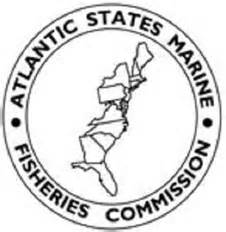 The state Department of Energy and Environmental Marine Fisheries Division will host a public hearing to get input on the Atlantic States Marine Fisheries Commission’s draft management plan for coastal sharks and for menhaden. The hearing will take place at 7 p.m. June 28 at DEEP Marine Headquarters, 333 Ferry Road. The purpose of the plan for coastal sharks is to maintain consistency between federal and state fishery management plans, where possible, and to better incorporate the intent of the smooth dogfish limited exception in the Shark Conservation Act of 2010 into state regulations. Fishermen and other interested groups are encouraged to provide input on the plan at the hearing or by providing written comment. Read the rest here 08:43
The state Department of Energy and Environmental Marine Fisheries Division will host a public hearing to get input on the Atlantic States Marine Fisheries Commission’s draft management plan for coastal sharks and for menhaden. The hearing will take place at 7 p.m. June 28 at DEEP Marine Headquarters, 333 Ferry Road. The purpose of the plan for coastal sharks is to maintain consistency between federal and state fishery management plans, where possible, and to better incorporate the intent of the smooth dogfish limited exception in the Shark Conservation Act of 2010 into state regulations. Fishermen and other interested groups are encouraged to provide input on the plan at the hearing or by providing written comment. Read the rest here 08:43
Atlantic States Marine Fisheries Commission revisit chance of reopening Maine shrimp fishery
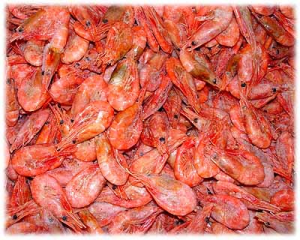 Interstate fishing regulators are revisiting the possibility of reopening Maine’s shrimp fishery, now in its third year of a shut down since warming oceans have negatively affected the shrimp population. Fishery managers with the Atlantic States Marine Fisheries Commission are opening up the possibility of new regulations to manage the fishery. Fishery Management Plan Coordinator Max Appelman said new regulations would address issues such as overfishing. “The big challenges facing this resource are overcapacity in the fishery and overcoming adverse effects of climate change,” Appelman said. (Here comes catch shares!) Read the rest here 13:48
Interstate fishing regulators are revisiting the possibility of reopening Maine’s shrimp fishery, now in its third year of a shut down since warming oceans have negatively affected the shrimp population. Fishery managers with the Atlantic States Marine Fisheries Commission are opening up the possibility of new regulations to manage the fishery. Fishery Management Plan Coordinator Max Appelman said new regulations would address issues such as overfishing. “The big challenges facing this resource are overcapacity in the fishery and overcoming adverse effects of climate change,” Appelman said. (Here comes catch shares!) Read the rest here 13:48
Long Island Commercial Fishing Association opposes offshore marine monument
 The Long Island Commercial Fishing Association has joined the Atlantic States Marine Fisheries Commission in the latter group’s motion to oppose the designation of an offshore marine monument in the Northeast Atlantic, which environmental groups support. Last week, the Atlantic States Marine Fisheries Commission’s Interstate Fisheries Management Program unanimously approved a resolution opposing any designation, but offering recommendations should such a monument be created. Bonnie Brady, executive director of the Long Island Commercial Fishing Association, released a statement on Friday in support of the fishery commission’s resolution. Read the rest here , Read ASMFC Urges Transparency and Public Input in Proposed New England Offshore Canyons & Seamounts Monument Decision Making Process, Letter to the Obama administration Click here 11:06
The Long Island Commercial Fishing Association has joined the Atlantic States Marine Fisheries Commission in the latter group’s motion to oppose the designation of an offshore marine monument in the Northeast Atlantic, which environmental groups support. Last week, the Atlantic States Marine Fisheries Commission’s Interstate Fisheries Management Program unanimously approved a resolution opposing any designation, but offering recommendations should such a monument be created. Bonnie Brady, executive director of the Long Island Commercial Fishing Association, released a statement on Friday in support of the fishery commission’s resolution. Read the rest here , Read ASMFC Urges Transparency and Public Input in Proposed New England Offshore Canyons & Seamounts Monument Decision Making Process, Letter to the Obama administration Click here 11:06
Long Island lobstermen oppose closures, question how regulators are making their decisions.
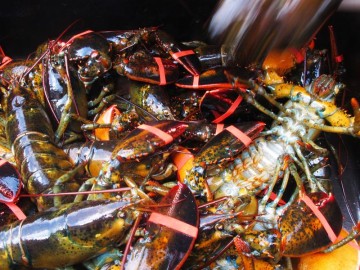 Long Island lobstermen, already straining under the weight of a seasonal closure of the Long Island Sound and sharply reduced lobster populations, face the potential for more closures as federal regulators work to rebuild a depleted stock. At a meeting of the Atlantic States Marine Fisheries Commission last week, the American Lobster Management Board agreed to review a series of new measures to address what they called the continuing decline in the Southern New England lobster fishery, which includes the . The fishery has been affected by environmental factors and fishing activity, the board said. Montauk lobsterman Al Schaffer said he and others saw a resurgence in the areas they fish around the Long Island Sound last year, though fishing is down thus far this spring. “There’s zero science,” he said, adding he strongly opposes any attempt to further restrict fishing. Read the story here 11:10
Long Island lobstermen, already straining under the weight of a seasonal closure of the Long Island Sound and sharply reduced lobster populations, face the potential for more closures as federal regulators work to rebuild a depleted stock. At a meeting of the Atlantic States Marine Fisheries Commission last week, the American Lobster Management Board agreed to review a series of new measures to address what they called the continuing decline in the Southern New England lobster fishery, which includes the . The fishery has been affected by environmental factors and fishing activity, the board said. Montauk lobsterman Al Schaffer said he and others saw a resurgence in the areas they fish around the Long Island Sound last year, though fishing is down thus far this spring. “There’s zero science,” he said, adding he strongly opposes any attempt to further restrict fishing. Read the story here 11:10
To avoid another massive fish kill in the Peconic, limits on bunker fishing lifted by “episodic event set aside program,”
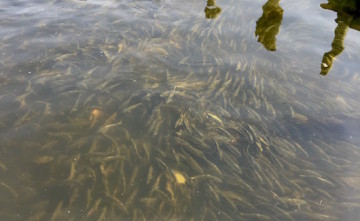 With unusually large numbers of bunker fish appearing in the Peconic River this spring, commercial fishermen will be allowed to net bunker in an effort to prevent the massive bunker kills seen last year, thanks to a ruling announced today by the Atlantic States Marine Fisheries Commission. The interstate commission, which limits how many fish can be caught each year, has agreed to add New York to a special program that allows greater numbers of bunker to be harvested in places where bunker are occurring in higher abundance than normal. The decision was made specifically to reduce the amount of bunker in the Peconic Estuary, where bunker have been reported in unusually large numbers since last month. Commercial fishermen will be allowed to use seine nets to capture bunker in the Peconic River. Up to one million pounds of bunker are allowed to be harvested under the episodic event set aside program. Read the rest here 14:25
With unusually large numbers of bunker fish appearing in the Peconic River this spring, commercial fishermen will be allowed to net bunker in an effort to prevent the massive bunker kills seen last year, thanks to a ruling announced today by the Atlantic States Marine Fisheries Commission. The interstate commission, which limits how many fish can be caught each year, has agreed to add New York to a special program that allows greater numbers of bunker to be harvested in places where bunker are occurring in higher abundance than normal. The decision was made specifically to reduce the amount of bunker in the Peconic Estuary, where bunker have been reported in unusually large numbers since last month. Commercial fishermen will be allowed to use seine nets to capture bunker in the Peconic River. Up to one million pounds of bunker are allowed to be harvested under the episodic event set aside program. Read the rest here 14:25
New Jonah crab rules for East Coast fishermen
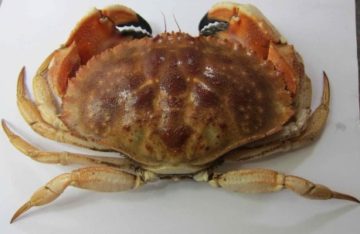 Fishing regulators say there will be a new limit on how many Jonah crabs fishermen will be allowed to harvest. East Coast fishermen’s catch of Jonah crabs has been growing in recent years as the crustacean grows in popularity. They are used in processed products and as an alternative to the more expensive Dungeness and stone crabs. The Atlantic States Marine Fisheries Commission has set a bycatch limit of 1,000 pounds of crabs per trip for trawl and net fishermen. Fishermen who unintentionally catch Jonah crabs using certain kinds of traps will face the same standard. Bycatch is incidental catch by fishermen who are seeking something else. The commission says the new standards will prevent increases in proliferation of traps. AP
Fishing regulators say there will be a new limit on how many Jonah crabs fishermen will be allowed to harvest. East Coast fishermen’s catch of Jonah crabs has been growing in recent years as the crustacean grows in popularity. They are used in processed products and as an alternative to the more expensive Dungeness and stone crabs. The Atlantic States Marine Fisheries Commission has set a bycatch limit of 1,000 pounds of crabs per trip for trawl and net fishermen. Fishermen who unintentionally catch Jonah crabs using certain kinds of traps will face the same standard. Bycatch is incidental catch by fishermen who are seeking something else. The commission says the new standards will prevent increases in proliferation of traps. AP
How will battery of new regulations affect Southern New England’s lobster fishermen?
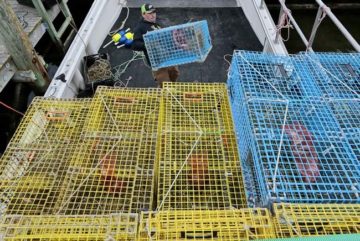 Southern New England’s fading lobster fishery will be subject to a battery of new regulations, possibly closed fishing areas and stricter size standards, to try to save the crustacean’s population locally.,, But the catches on SouthCoast have not been as bad as the numbers may indicate, local lobstermen say. “The past three years have been the best I’ve ever seen,” said Jarrett Drake, a lobsterman in Marion for 26 years. “And that’s the same for everyone around me, the stock assessments are brought down by places off Virginia and Maryland that aren’t doing very well.” The overall decline, however, is here to stay, said Beth Casoni, associate executive director for the Mass. Lobstermen’s Association. “The environmental factors will continue to cause this decline, with what we know about warming,” Casoni said. “But it’s unfortunate that Massachusetts and Rhode Island Area Two, lobstermen are in this stock that is in such a downward spiral.” Read the rest here 14:47
Southern New England’s fading lobster fishery will be subject to a battery of new regulations, possibly closed fishing areas and stricter size standards, to try to save the crustacean’s population locally.,, But the catches on SouthCoast have not been as bad as the numbers may indicate, local lobstermen say. “The past three years have been the best I’ve ever seen,” said Jarrett Drake, a lobsterman in Marion for 26 years. “And that’s the same for everyone around me, the stock assessments are brought down by places off Virginia and Maryland that aren’t doing very well.” The overall decline, however, is here to stay, said Beth Casoni, associate executive director for the Mass. Lobstermen’s Association. “The environmental factors will continue to cause this decline, with what we know about warming,” Casoni said. “But it’s unfortunate that Massachusetts and Rhode Island Area Two, lobstermen are in this stock that is in such a downward spiral.” Read the rest here 14:47
ASMFC Spring Meeting – May 2-5, 2016, Alexandria, Virginia
 The Atlantic States Marine Fisheries Commission will meet in Alexandria, Virginia at The Westin Alexandria 400 Courthouse Square May 2-5, 2016. The agenda is subject to change. The agenda reflects the current estimate of time required for scheduled Board meetings. The Commission may adjust this agenda in accordance with the actual duration of Board meetings. Interested parties should anticipate Boards starting earlier or later than indicated herein. Board/Section meeting proceedings will be broadcast daily via webinar beginning at 9:00 a.m. on May 2nd and continuing daily until the conclusion of the meeting (expected to be 2:30 p.m.) on May 5th. Click here for details, Click here for webinar 18:42
The Atlantic States Marine Fisheries Commission will meet in Alexandria, Virginia at The Westin Alexandria 400 Courthouse Square May 2-5, 2016. The agenda is subject to change. The agenda reflects the current estimate of time required for scheduled Board meetings. The Commission may adjust this agenda in accordance with the actual duration of Board meetings. Interested parties should anticipate Boards starting earlier or later than indicated herein. Board/Section meeting proceedings will be broadcast daily via webinar beginning at 9:00 a.m. on May 2nd and continuing daily until the conclusion of the meeting (expected to be 2:30 p.m.) on May 5th. Click here for details, Click here for webinar 18:42
Elver fishermen unite as tribes agree to new rules
 Last year, Maine fishermen harvested elvers worth more than $11.4 million from the state’s streams and rivers. That made the fishery for the tiny, translucent juvenile eels the fourth most valuable in the state, but it still wasn’t a good year. A cold, dry spring delayed the migration of elvers from the sea into the rivers where harvesters set their gear. As a result, Maine fishermen landed just 5,259 pounds of the tiny wrigglers, little more than half the 9,688-pound quota allocated the state by the Atlantic States Marine Fisheries Commission. When the Maine Elver Fishermen Association gathered for its annual meeting Saturday morning, harvesters received some good news from Department of Marine Resources Commissioner Patrick Keliher and former MEFA Executive Director Jeffrey Pierce. Read the article here 09:42
Last year, Maine fishermen harvested elvers worth more than $11.4 million from the state’s streams and rivers. That made the fishery for the tiny, translucent juvenile eels the fourth most valuable in the state, but it still wasn’t a good year. A cold, dry spring delayed the migration of elvers from the sea into the rivers where harvesters set their gear. As a result, Maine fishermen landed just 5,259 pounds of the tiny wrigglers, little more than half the 9,688-pound quota allocated the state by the Atlantic States Marine Fisheries Commission. When the Maine Elver Fishermen Association gathered for its annual meeting Saturday morning, harvesters received some good news from Department of Marine Resources Commissioner Patrick Keliher and former MEFA Executive Director Jeffrey Pierce. Read the article here 09:42
Atlantic States Marine Fisheries Commission approves NJ option for summer flounder
New Jersey is one step closer to becoming its own summer flounder management region. The  unanimously approved an option Tuesday during their winter meetings in Virginia to allow for a New Jersey/Delaware Bay management region. It would pull the state out of its present management region which it shares with Connecticut and New York.The New Jersey Marine Fisheries Council must now vote to adopt the measure. The council’s next meeting is March 3. Read the rest here 19:21
unanimously approved an option Tuesday during their winter meetings in Virginia to allow for a New Jersey/Delaware Bay management region. It would pull the state out of its present management region which it shares with Connecticut and New York.The New Jersey Marine Fisheries Council must now vote to adopt the measure. The council’s next meeting is March 3. Read the rest here 19:21
Regulators Postpone Plan to Try to Preserve Lobsters
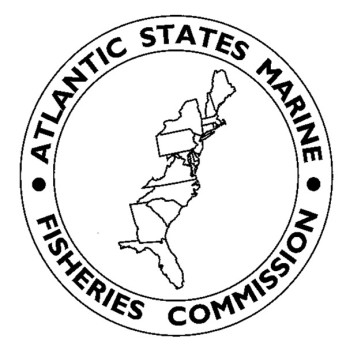 Interstate fishing regulators have decided to hold off on starting the process of crafting a plan to try to preserve the dwindling southern New England lobster stock. A board of the voted Tuesday to postpone authorizing a new management plan for the fishery. A plan could address issues such as trap reductions and closed seasons for lobster fishermen. Southern New England’s lobster fishery is a historic industry in decline. Scientists say the area’s lobster population has sunk to its lowest levels on record. Lobster supply to consumer remains strong because of heavy catch off Maine and Canada. The board decided to postpone the initiation of the plan to allow a technical committee to do more work. It could revisit the issue in May or August. Link 17:48
Interstate fishing regulators have decided to hold off on starting the process of crafting a plan to try to preserve the dwindling southern New England lobster stock. A board of the voted Tuesday to postpone authorizing a new management plan for the fishery. A plan could address issues such as trap reductions and closed seasons for lobster fishermen. Southern New England’s lobster fishery is a historic industry in decline. Scientists say the area’s lobster population has sunk to its lowest levels on record. Lobster supply to consumer remains strong because of heavy catch off Maine and Canada. The board decided to postpone the initiation of the plan to allow a technical committee to do more work. It could revisit the issue in May or August. Link 17:48
Gulf of Maine lobster stock at an all-time high
 A recent lobster stock assessment shows the population of the state’s famous bottom-dwelling crustacean at record highs in the Gulf of Maine. Through data collected by fishery-dependent and fishery-independent sources, the stock assessment gives fishermen and scientists a picture of the condition of the economically important stock. According to the Atlantic States Marine Fisheries Commission, the 2015 benchmark stock assessment for lobsters shows the stock of crustaceans in the Gulf of Maine and Georges Bank is not depleted and overfishing is not occurring. However, the situation for the stock in southern New England is far less clear,,, Read the article here 12:52
A recent lobster stock assessment shows the population of the state’s famous bottom-dwelling crustacean at record highs in the Gulf of Maine. Through data collected by fishery-dependent and fishery-independent sources, the stock assessment gives fishermen and scientists a picture of the condition of the economically important stock. According to the Atlantic States Marine Fisheries Commission, the 2015 benchmark stock assessment for lobsters shows the stock of crustaceans in the Gulf of Maine and Georges Bank is not depleted and overfishing is not occurring. However, the situation for the stock in southern New England is far less clear,,, Read the article here 12:52
New England States prepare to review new rules for herring fishery
 The new year will soon be here, and with it comes a new round of significant changes to the rules governing the herring fishery. Next week, the Department of Marine Resources will hold a public hearing on what is known as “Draft Amendment 3 to the Interstate Management Plan for Atlantic Herring.” Hearings are also scheduled in New Hampshire, Massachusetts and Rhode Island. According to the ASMFC, the new rules would affect the inshore Gulf of Maine — called Area 1A — herring fishery to reflect changes in both the herring resource and the fishery itself. Read the article here 08:30
The new year will soon be here, and with it comes a new round of significant changes to the rules governing the herring fishery. Next week, the Department of Marine Resources will hold a public hearing on what is known as “Draft Amendment 3 to the Interstate Management Plan for Atlantic Herring.” Hearings are also scheduled in New Hampshire, Massachusetts and Rhode Island. According to the ASMFC, the new rules would affect the inshore Gulf of Maine — called Area 1A — herring fishery to reflect changes in both the herring resource and the fishery itself. Read the article here 08:30
Omega Protein : Conservation groups and legislators look to change menhaden regulations
 With the lights of the Chesapeake Bay Bridge-Tunnel twinkling in the background, Barry Knight looked at a room full of supporters and realized he no longer was alone. For nearly a decade, the Republican member of the Virginia House of Delegates has been trying to wrestle the menhaden fishing industry from the grasp of the state’s General Assembly. An environmentally conscious angler and a rural Virginia Beach pig farmer, he has wondered for years why menhaden are the only species in Virginia waters that are not controlled by the Virginia Marine Resources Commission. Read the article here 15:31
With the lights of the Chesapeake Bay Bridge-Tunnel twinkling in the background, Barry Knight looked at a room full of supporters and realized he no longer was alone. For nearly a decade, the Republican member of the Virginia House of Delegates has been trying to wrestle the menhaden fishing industry from the grasp of the state’s General Assembly. An environmentally conscious angler and a rural Virginia Beach pig farmer, he has wondered for years why menhaden are the only species in Virginia waters that are not controlled by the Virginia Marine Resources Commission. Read the article here 15:31
Shrimpers wanted for Atlantic States Marine Fisheries Commission research program
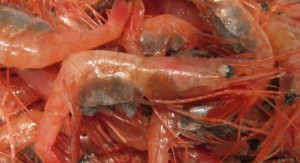 The commission, which hopes to begin the test-tow portion of the the program in mid-January and the trap portion about a month after that, is looking for a total of four trawl vessels and two trap vessels from New Hampshire, Maine or Massachusetts. The $10,000 program is designed to catch the northern shrimp, Pandalus borealis, while they are in inshore waters to collect data on the timing of the egg hatch, as well as the size, gender and development stages of the shrimp. Read the article here 07:44
The commission, which hopes to begin the test-tow portion of the the program in mid-January and the trap portion about a month after that, is looking for a total of four trawl vessels and two trap vessels from New Hampshire, Maine or Massachusetts. The $10,000 program is designed to catch the northern shrimp, Pandalus borealis, while they are in inshore waters to collect data on the timing of the egg hatch, as well as the size, gender and development stages of the shrimp. Read the article here 07:44
2016 Maine shrimp fishing season canceled
 The Atlantic States Marine Fisheries Commission’s Northern Shrimp Section voted Monday to cancel the 2016 Maine shrimp fishing season. A report written by the Atlantic States Marine Fisheries Commission’s Northern Shrimp Technical Committee said, “Given the depleted condition of the resource and poor prospects for the near future, the NSTC recommends that the Northern Shrimp Section extend the moratorium on fishing through 2016.” Read the article here 17:18 Then this, Maine shrimp fishing ban extended amid warming water fear 17:33
The Atlantic States Marine Fisheries Commission’s Northern Shrimp Section voted Monday to cancel the 2016 Maine shrimp fishing season. A report written by the Atlantic States Marine Fisheries Commission’s Northern Shrimp Technical Committee said, “Given the depleted condition of the resource and poor prospects for the near future, the NSTC recommends that the Northern Shrimp Section extend the moratorium on fishing through 2016.” Read the article here 17:18 Then this, Maine shrimp fishing ban extended amid warming water fear 17:33
More black sea bass added to quota
 The Atlantic States Marine Fisheries Commission’s (ASMFC) Summer Flounder, Scup and Black Sea Bass Management Board last week approved increases to the 2016 black sea bass commercial quota and recreational harvest limit (RHL). This means more black sea bass can be taken by commercial and recreational fishermen. The ASMFC announced that the commercial quota is now being set at 2.71 million pounds (was going to be 2.24 million pounds) and the RHL is being set at 2.88 million pounds (was at 2.33 million pounds). Read the rest here 17:22
The Atlantic States Marine Fisheries Commission’s (ASMFC) Summer Flounder, Scup and Black Sea Bass Management Board last week approved increases to the 2016 black sea bass commercial quota and recreational harvest limit (RHL). This means more black sea bass can be taken by commercial and recreational fishermen. The ASMFC announced that the commercial quota is now being set at 2.71 million pounds (was going to be 2.24 million pounds) and the RHL is being set at 2.88 million pounds (was at 2.33 million pounds). Read the rest here 17:22
Net Effect: The fight over flounder
David Sneed is executive director of the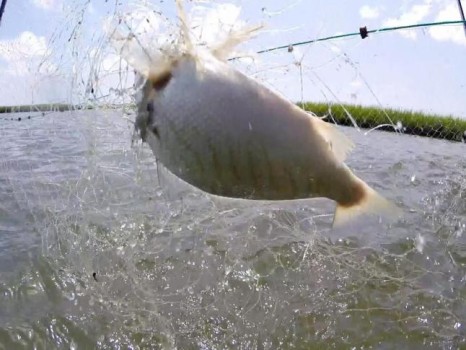 , the main group representing recreational fishermen. He says commercial fishermen have blocked attempts to reduce the use of gill nets. “The science has been there to say, ‘Hey, we need to pull back on this. We’re over-harvesting these fish,’ but the push has always been there to say, ‘No, we need to catch more fish, you know, we need to be able to make money off of this resource.’” But Jerry Schill, executive director of the NC Fisheries Association, the main group representing commercial fishermen, says the flounder fishery is not being overharvested. Read the rest here 09:19
, the main group representing recreational fishermen. He says commercial fishermen have blocked attempts to reduce the use of gill nets. “The science has been there to say, ‘Hey, we need to pull back on this. We’re over-harvesting these fish,’ but the push has always been there to say, ‘No, we need to catch more fish, you know, we need to be able to make money off of this resource.’” But Jerry Schill, executive director of the NC Fisheries Association, the main group representing commercial fishermen, says the flounder fishery is not being overharvested. Read the rest here 09:19
Southern Flounder – Disputed fisheries studies: Politics or inexact science?
 Science plays a big role in managing fisheries. Scientists assess fish stocks, migration patterns, environmental issues — useful data that allow regulators to set policy. We expect our science to be accurate and unaffected by politics, and as citizens, we expect political actors to treat science in the same manner.,, Yet a series of e-mails found their way into the public domain from a 2007 round-robin discussion among several N.C. Division of Marine Fisheries scientists trying to peg a mortality rate for speckled seatrout caught by recreational anglers. See video It would take a few hundred words to demonstrate where science goes off the rails and how other factors, including interest group reactions, exert an influence on what is expected to be an unbiased, fact-driven process. Read the rest here 10:30
Science plays a big role in managing fisheries. Scientists assess fish stocks, migration patterns, environmental issues — useful data that allow regulators to set policy. We expect our science to be accurate and unaffected by politics, and as citizens, we expect political actors to treat science in the same manner.,, Yet a series of e-mails found their way into the public domain from a 2007 round-robin discussion among several N.C. Division of Marine Fisheries scientists trying to peg a mortality rate for speckled seatrout caught by recreational anglers. See video It would take a few hundred words to demonstrate where science goes off the rails and how other factors, including interest group reactions, exert an influence on what is expected to be an unbiased, fact-driven process. Read the rest here 10:30
Atlantic States Marine Fisheries Commission’s limited entry scheme for Maine Shrimp Fishery postponed
Regulators are taking the possibility of a limited entry program for Maine’s shuttered shrimp fishery off the table for now. The  Northern Shrimp Section is postponing the development of the plan until next summer. The group has been looking at ways to manage the future of the fishery, including the possibility of allowing fewer fishermen to participate. The shrimp section is meeting on Dec. 7 to set specifications for the 2016 shrimp fishing season. A spokeswoman for the section says it is unlikely there will be a season at all in 2016. Link 09:48
Northern Shrimp Section is postponing the development of the plan until next summer. The group has been looking at ways to manage the future of the fishery, including the possibility of allowing fewer fishermen to participate. The shrimp section is meeting on Dec. 7 to set specifications for the 2016 shrimp fishing season. A spokeswoman for the section says it is unlikely there will be a season at all in 2016. Link 09:48
Federal regulators are eyeing a possible moratorium on eel fishing in Delaware waters
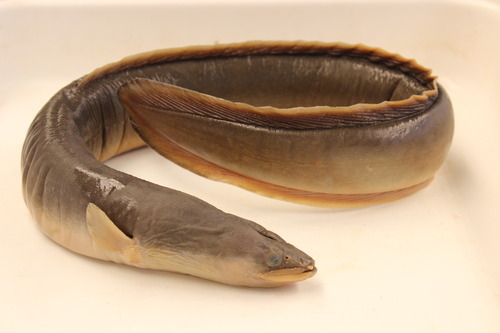 The National Marine Fisheries Service is reviewing a referral from the Atlantic States Marine Fisheries Commission that found Delaware out of compliance with the interstate management plan for American eel, whose numbers are depleted.If the national agency determines that Delaware failed to carry out its responsibilities, and that the measures the state failed to implement are necessary for conservation, then it must declare a moratorium on eel fishing in Delaware waters. A determination must be made by Sept. 18. link 10:24
The National Marine Fisheries Service is reviewing a referral from the Atlantic States Marine Fisheries Commission that found Delaware out of compliance with the interstate management plan for American eel, whose numbers are depleted.If the national agency determines that Delaware failed to carry out its responsibilities, and that the measures the state failed to implement are necessary for conservation, then it must declare a moratorium on eel fishing in Delaware waters. A determination must be made by Sept. 18. link 10:24

































